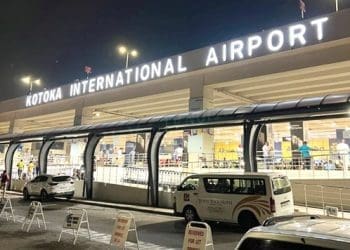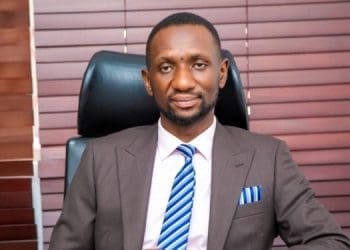A united front of Ghana’s top health policymakers has declared an uncompromising crackdown on illegal co-payments in health facilities, describing the practice as a growing menace that undermines public confidence in the National Health Insurance Scheme (NHIS) and places an unfair burden on the poor.
At the opening of the National Health Insurance Authority (NHIA) Stakeholders’ Conference in Accra, the Chief of Staff, Julius Debrah, Minister of Health, Kwabena Mintah Akandoh, and NHIA Chief Executive Officer, Dr Victor Bampoe, each issued strong warnings to health facilities that continue to charge patients extra fees beyond what the NHIS covers.
The conference, held under the theme “Consolidating Strategic Partnerships for a Resilient and Inclusive Health Insurance Scheme,” brought together policymakers, development partners, civil society actors, and healthcare providers to deliberate on the future of Ghana’s health financing system and the country’s goal of achieving Universal Health Coverage (UHC) by 2030.
Debrah: Illegal charges erode trust and must end
Chief of Staff Julius Debrah opened the conference with a firm declaration that the government would not tolerate the imposition of unauthorised co-payments, which he described as “unacceptable and unlawful.”
“Co-payments, though legitimate in some countries, are not accepted under Ghana’s NHIS,” Mr. Debrah said.
“These unauthorised charges place undue burdens on the poor and must be eliminated. They erode public trust and deepen inequality.”

He endorsed the NHIA’s zero-tolerance campaign and praised the creation of a national task force, to be replicated at regional and district levels, to investigate and recommend lasting solutions to the problem.
Mr. Debrah said the government’s health agenda was anchored on equity, efficiency, and sustainability, with the NHIA serving as the main vehicle for delivering financial risk protection to all Ghanaians.
He lauded the Authority’s leadership for introducing prompt claims payments and digital reforms, which he said were helping to restore confidence among healthcare providers.
NHIA pays GH₵2.8bn to service providers
“As of today, GH₵2.8 billion has been paid to healthcare providers this year alone,” he revealed.
“This timely injection of funds is boosting provider confidence, driving compliance, and encouraging greater enrollment.”
Mr. Debrah further announced that the government had uncapped the National Health Insurance Levy, unlocking an additional GH₵3.4 billion to support operations, claims, and administrative functions.
On innovation, he highlighted the introduction of biometric membership authentication devices at provider sites, describing them as “a major step toward accountability, safety, and operational efficiency.”
The Chief of Staff also used the platform to announce progress on two major health initiatives — the Ghana Medical Care Trust Fund (Mahama Cares) and the Free Primary Healthcare (FPHC) programme — which he said would expand access to treatment for non-communicable diseases and make basic healthcare services free at the point of access.
“These programmes will ensure that quality healthcare is not a privilege, but a right for every Ghanaian,” he said.
Mr. Debrah concluded his address by calling for extensive public education to raise awareness of the NHIS benefits and citizen rights.
“Let us go beyond our offices into communities, schools, churches, mosques, markets, and lorry parks to educate Ghanaians,” he said. “Public awareness is our best defense against exploitation.”
Akandoh: Co-payments undermine scheme credibility
Health Minister Kwabena Mintah Akandoh reinforced the Chief of Staff’s message, warning that illegal co-payments by some credentialed facilities had become one of the most damaging threats to the NHIS.
“When citizens go to health facilities and are asked to pay extra despite being covered, it erodes trust and defeats the very purpose of the scheme,” Mr. Akandoh said. “We must aggressively pursue and sanction facilities that engage in such practices.”
The Minister acknowledged that while the government had made progress in stabilising the NHIS through domestic resource mobilisation, the problem of illegal payments required a strong, coordinated response between regulators, service providers, and the public.
“It is not by coincidence that we have a sustainable NHIS today,” he said. “When you have a strong internal funding base, there are no strings attached, and you can invest where it is needed most.”
Mr. Akandoh assured service providers that the government was finalising work on realistic tariff adjustments, adding that the capping of the National Health Insurance Levy had already been removed — a promise he said had been “made and kept by His Excellency John Dramani Mahama.”
He revealed that work on the Free Primary Health Care policy was nearing implementation, with stakeholder consultations underway, and said it would remove cost barriers for all Ghanaians, insured or not.
“The policy has been developed and is now at the stakeholder consultation stage. Very soon, Ghanaians will begin to see real action on the ground,” he said.
Legislative Instrument
Mr. Akandoh concluded by pledging to fast-track the National Health Insurance Legislative Instrument (L.I.), which would strengthen the scheme’s legal framework, and invited the private sector to partner government in delivering on its health transformation agenda.
Bampoe: NHIA launches zero-tolerance campaign
NHIA Chief Executive Dr Victor Bampoe was equally emphatic in his condemnation of illegal charges, describing them as the single greatest challenge facing the scheme today.
“These illegal fees — often demanded at the point of need — undermine the very purpose of the Scheme,” Dr Bampoe said.
“They erode public trust, deepen inequality, and place undue burdens on the poor and vulnerable.”
He said the Zero Tolerance Campaign against co-payments was being expanded nationwide, supported by a task force at national, regional, and district levels.
The initiative, he added, would include robust investigations, sanctions, and a comprehensive public education drive to expose offending facilities.
“I encourage the NHIA to scale up public education to address misconceptions and attract more members,” he said.
“Let us go into communities, schools, churches, mosques, markets, and lorry parks to educate Ghanaians about the scheme’s benefits. Public awareness is our best defense against exploitation.”
Dr Bampoe also presented progress made in digitising claims management and reducing fraud through reforms and biometric authentication.
He disclosed that Parliament had approved GH₵10.7 billion for the NHIA to support claims, operations, and administration in 2025.

“The NHIA has, this year alone, disbursed over GH₵2.8 billion for healthcare services. This timely injection of funds is increasing provider confidence, encouraging compliance, and driving enrollment growth,” he said.
He said the Authority’s reforms were designed to make the NHIS more resilient, transparent, and accessible, and would soon be complemented by two flagship government initiatives — Mahama Cares and Free Primary Healthcare — both expected to extend financial protection to vulnerable populations.
A renewed commitment to universal health coverage
All three speakers — Debrah, Akandoh, and Bampoe — pledged to work collaboratively to strengthen the NHIS as Ghana’s flagship social protection programme and accelerate progress toward Universal Health Coverage by 2030.
They called for greater partnerships between government, civil society, faith-based institutions, and the media, emphasising that a strong and inclusive health system was not just a social necessity but a foundation for Ghana’s broader economic transformation.














